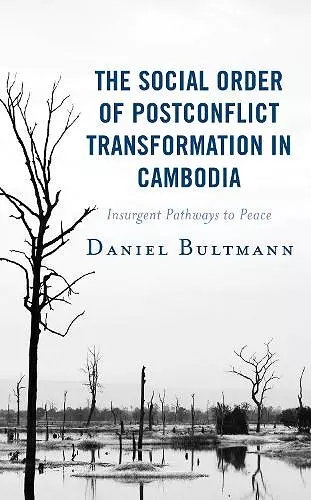The Social Order of Postconflict Transformation in Cambodia
Insurgent Pathways to Peace
Format:Hardback
Publisher:Bloomsbury Publishing PLC
Published:15th Nov '18
Currently unavailable, and unfortunately no date known when it will be back

Drawing on data from three different insurgent groups within the Cambodian conflict, the book shows how the social backgrounds of combatants and commanders cause them to pursue different strategies during a decade-long transition into various postconflict settings, thereby creating different “pathways to peace.” By highlighting different vertical and horizontal ranks within the insurgent groups and the role of belligerents’ resources and networks, this qualitative study tackles an imbalance in the current research on Disarmament, Demobilization, and Reintegration (DDR), which tends to focus on top-down planning and the technicalities of reintegration programs. It helps explain why conflict dynamics and path-dependencies differ among various social groups within the field of insurgency. By analyzing the social position, life courses and postconflict trajectories of various groups within the insurgency, the book emphasizes the diversity of transitions to peace and “brings the social back in.”
The study is grounded in in-depth fieldwork conducted in Cambodia and its diaspora, including 168 firsthand interviews with ex-combatants from groups as diverse as Buddhist monks and Christian converts, intellectuals, powerful warlords, civil servants, and female communist soldiers. Using these details, the book not only builds a theory of the social structure and internal logic of armed groups, but also emphasizes the crucial importance of fighters’ own narratives about their roles in society. Therefore, in addition to advancing a sociological perspective on post-conflict transitions, the study also provides the most detailed treatment to date of the social fields of the insurgents who fought in the civil war that followed the fall of the Khmer Rouge regime in 1979. These social fields continue to have a profound influence on Cambodian politics, even today.
In this book, Bultmann develops a multidimensional approach to understand how post-conflict fates differ across groups and individuals. He highlights the difficulties in transitioning to a peace processes by emphasizing the importance of differences in the network structure of rebel groups as well as the social and cultural background of ex-combatants. This book is very helpful for understanding how disarmament, demobilization, and reintegration efforts can be better designed to secure a long-term stable peace. -- Ernesto Adolfo Cárdenas Prieto, Pontifical Xavierian University
Daniel Bultmann’s examination of three Cambodian insurgent groups brings us to a higher level of understanding of why post-conflict stability is often so elusive. Bultmann’s use of the field-theoretic approach, coupled with his extraordinary fieldwork, makes this book an important contribution to critical security studies and research on conflict. -- Claire Metelits, Marine Corps University
ISBN: 9781498580540
Dimensions: 231mm x 160mm x 20mm
Weight: 445g
182 pages